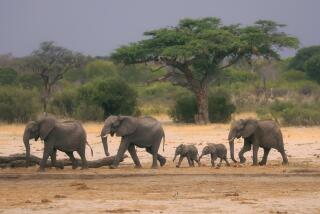Mountain gorillas could be at risk in Virunga National Park, Congo
The nearly 2 million acres in the Democratic Republic of Congo encompass some of the worldâs most biodiverse topography: glaciers, tropical rain forest, acacia savanna, lakes and active volcanoes. Itâs home to mountain and lowland gorillas, chimpanzees, tree-dwelling lions, okapi and hundreds of other endangered species.
It also houses the worldâs only gorilla orphanage. The four that live there were orphaned as babies because of poaching and violence. Theyâve been hand-raised by park rangers, who have devoted their lives to being gorilla mothers.
Itâs easy to spend hours on the viewing platform watching the endearingly humanoid apes go about daily life. Ndakasi has separation anxiety and, despite weighing 120 pounds, still demands piggyback rides from her caregivers. Matabishi is the baby, spoiled by one and all; Maishi is the tender one who fusses over Matabishi; and Ndeze is the bossy matriarch, whacking the others when she feels theyâve misbehaved.
Unless the world acts now, there will be more of these orphans and fewer wild gorillas. Eastern Congoâs decade-long war is purportedly over, and Virunga has ramped up its tourism efforts in order to help save the gentle-natured apes. But the park faces another threat that may put an end to tourism before it becomes fully realized. Virunga may be sitting atop immense oil resources. In a nation ranked by the World Bank as one of the poorest in the world, the temptations of this are overwhelming, even though Congolese law makes it illegal to drill in a national park, let alone a World Heritage Site.
The proposed drilling area is not in the gorillasâ territory, but fighting has occurred over the parkâs potential mineral wealth. In 2007 men with AK-47s traipsed into jungle and slaughtered nine gorillas, perhaps thinking that if the apes were gone there would be no reason to protect the park from mining and drilling.
A healthy tourism economy is the one viable alternative. âThe DRC is four times the size of Kenya and far more diverse,â Virunga National Park director Emmanuel de Mérode said. âIn 2012, Kenya earned over a billion dollars with tourism. The potential for the DRC is huge, and the financial benefit to the Congolese people long-lasting.â
A new documentary titled âVirungaâ exposes the behind-the-scenes skulduggery that occurs when the worlds of conservation and oil collide. Two days before the filmâs New York premiere in April, De Mérode, who has vigorously protected the park and its animals and opposes drilling, was ambushed and shot four times. Incredibly, he survived and lives on to fight the battle.
Will our insatiable appetite for energy in the name of progress leave us with a planet bereft of remote places and wild creatures?
I sit still and look into a tiny gorillaâs eyes, and the tragedy of the wrong answer makes me angry.
Info: Virunga National Park, https://www.virunga.org; U.S. State Department warning: https://www.1.usa.gov/1m5ZtXT
More to Read
Sign up for The Wild
Weâll help you find the best places to hike, bike and run, as well as the perfect silent spots for meditation and yoga.
You may occasionally receive promotional content from the Los Angeles Times.





